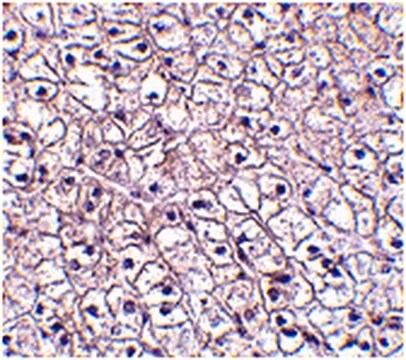GS65
GST M1-1, Recombinant Human
Sinonimo/i:
GST1, GSTM1-1, GSTM1a-1a, GSTM1b-1b, GTH4, GTM1, H-B, MU, MU-1, glutathione S-transferase mu 1
About This Item
Prodotti consigliati
Origine biologica
human
Livello qualitativo
Ricombinante
expressed in E. coli
Saggio
>95% (SDS-PAGE)
Forma fisica
frozen liquid
Attività specifica
97.96 units/mg protein (using spectrophotometric determination of 1-chloro-2,4-dinitrobenzene (CDNB) conjugation with reduced glutathione (1 mM) in 100 mM NaPO4 (pH 6.5) at room temperature.)
PM
26 kDa
Concentrazione
3.1 mg/mL
Temperatura di conservazione
−70°C
Informazioni sul gene
human ... GSTM1(2944)
Azioni biochim/fisiol
Stoccaggio e stabilità
Codice della classe di stoccaggio
10 - Combustible liquids
Classe di pericolosità dell'acqua (WGK)
WGK 1
Punto d’infiammabilità (°F)
Not applicable
Punto d’infiammabilità (°C)
Not applicable
Certificati d'analisi (COA)
Cerca il Certificati d'analisi (COA) digitando il numero di lotto/batch corrispondente. I numeri di lotto o di batch sono stampati sull'etichetta dei prodotti dopo la parola ‘Lotto’ o ‘Batch’.
Possiedi già questo prodotto?
I documenti relativi ai prodotti acquistati recentemente sono disponibili nell’Archivio dei documenti.
Il team dei nostri ricercatori vanta grande esperienza in tutte le aree della ricerca quali Life Science, scienza dei materiali, sintesi chimica, cromatografia, discipline analitiche, ecc..
Contatta l'Assistenza Tecnica.



